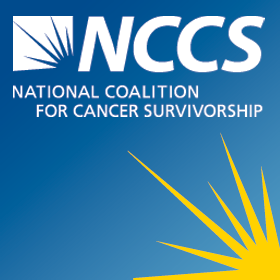Comments on Medication Adherence to Office of Surgeon General
Department of Health and Human Services
Office of the Surgeon General
Room 710-H
200 Independence Avenue, SW
Washington, DC 20201
Filed via email at medadhere@hhs.gov
The National Coalition for Cancer Survivorship (NCCS) is dedicated to improving access to quality cancer care. NCCS provides educational tools and materials to assist cancer survivors in the management of their care from diagnosis and across the cancer care continuum. NCCS also advances public policy solutions that will enhance delivery and payment for cancer care. We are pleased to provide comments related to medication non-adherence among adults with chronic conditions. Our recommendations are specific to the experience of cancer survivors, and relevant for those with other chronic conditions.
We are pleased that the Surgeon General’s request acknowledges the complexity of medication adherence and that it recommends the involvement of both health care providers and patients. We recommend that the stakeholders be defined broadly to include third-party payers and policy-makers, because payment reform may be necessary to fully address medication adherence issues, and also to include family members, whose involvement in the care experience may be critical to solving the problem of non-adherence.
Cancer patients often have significant challenges to completing chemotherapy, including: the toxicities associated with many chemotherapy drugs; the difficulties—time away from work, travel expense and burden, and emotional stress—associated with completion of a course of treatment which may stretch over months and which may also require significant time for each chemotherapy administration; inadequate management of treatment side effects, and the financial burden of chemotherapy, which is acute for those who are uninsured or underinsured but may affect the insured if cost-sharing responsibilities are substantial.
The addition of oral anti-cancer agents for cancer has created new challenges to medication adherence. Advocates suggest that adherence lags because patients may be prescribed a full oral medication regimen with little follow-up from their providers. Some cancer care professionals have suggested that medical adherence programs of third-party payers, although well intentioned, often conflict with the medication outreach and adherence efforts of the care team. All parties cite the economic barriers that may exist due to cost-sharing regimens that are pegged at 20% or greater levels of co-insurance.
We recommend completion of more research on the different systems of coverage and payment for oral, self-administered cancer drugs and intravenous, physician-administered cancer therapies to ascertain the full scope and impact of economic burdens to medication non-adherence. Such research may also lead to the development of policy solutions that would eliminate any disparities in the coverage and payment for cancer drugs on the basis of the manner of their administration or site of care. The elimination of cost-sharing responsibilities as a major factor in the choice of care would be a step toward higher quality cancer care.
Even without research, positive steps to improve cancer medication adherence can be taken. NCCS proposes the implementation of a rigorous system of cancer care planning which would entail health provider development of a written care plan and communication of that plan to the newly diagnosed patient. NCCS has long advocated the establishment of a Medicare service for cancer care planning and the adoption of and payment for such service by private payers. Cancer care planning will help to identify the goals of cancer treatment, the strategy for management cancer treatment side effects, management of the cost of care, and coordination of all elements of care and all providers of care. Most fundamentally, a cancer care plan helps to empower the patient to make well-informed treatment decisions that contributes to the management of his or her care.



